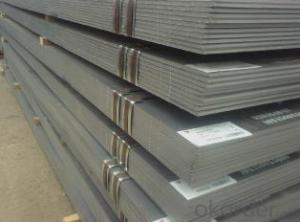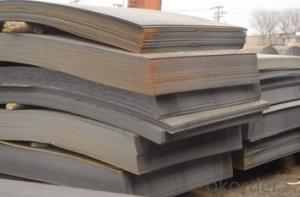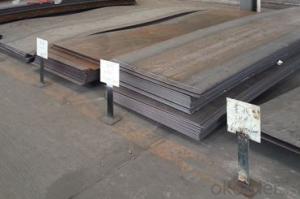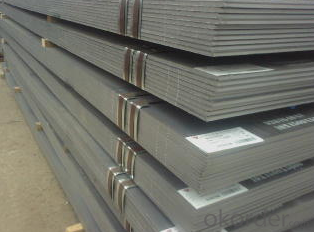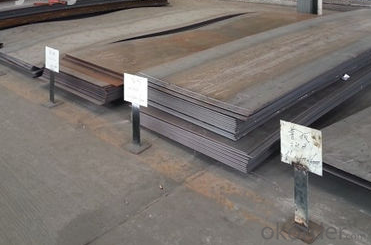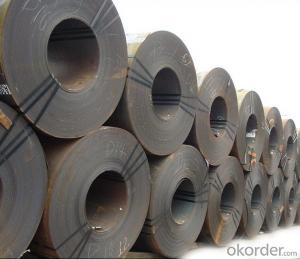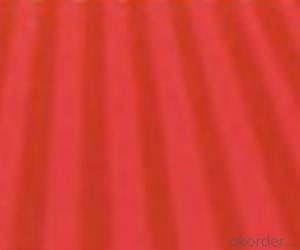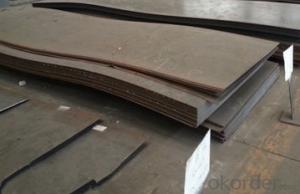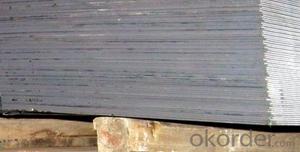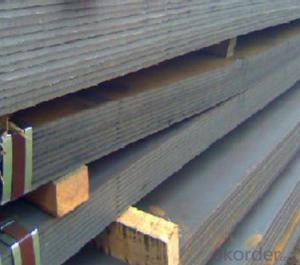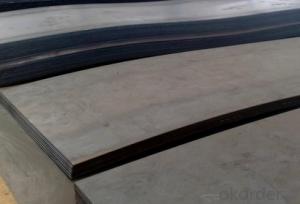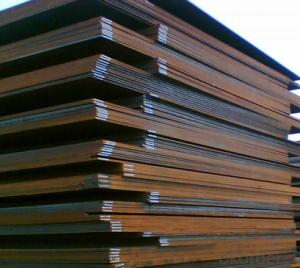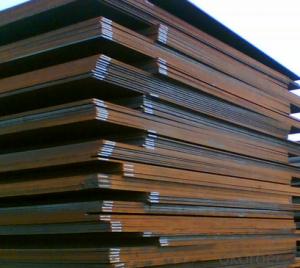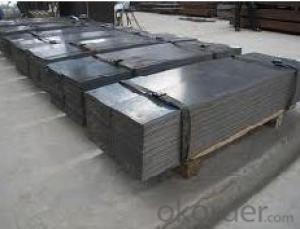Hot Rolled Carbon Steel Plate,Carbon Steel Sheet Q215, CNBM
- Loading Port:
- Qingdao
- Payment Terms:
- TT OR LC
- Min Order Qty:
- 10 pc
- Supply Capability:
- 30 pc/month
OKorder Service Pledge
OKorder Financial Service
You Might Also Like
Quick Details
| Standard: | AISI, ASTM, GB, JIS | Grade: | Q195,Q235,Q345,A36,C45 | Thickness: | 1.0-30MM |
| Model Number: | Q235,Q195,Q345 | ||||
| Type: | Steel Plate | Technique: | Hot Rolled | Surface Treatment: | Coated |
| Application: | Ship Plate | Special Use: | Silicon Steel | Width: | 30-2000mm |
| Length: | as your requirement | standard: | hot rolled | Surface: | Anti-rust oil |
Packaging & Delivery
| Packaging Details: | seaworthy packages or as customers' require |
| Delivery Detail: | within 15 days after the advance payment |
Hot rolled steel plate
1 carbon steel plate 3mm thick General information
| Product name | Type | Specification | Implementation of GB | ||
| thick | wide | long | |||
| Carbon structural steel | Q195,Q215, Q235A,Q235B, Q235C,Q255, Q275 | 4-120 | 1500-4500 | 6000-12000 | GB/T700-2006 |
| Low-alloy structural steel | Q295,Q345A, Q345B,Q2345C | 4-120 | 1500-4500 | 6000-12000 | BG/T1591-1994 |
| Quality carbon structural stee | 30-50 | 4-120 | 1500-4500 | 6000-12000 | BG/T699-1999 |
| Ship steel | CCSA,CCSB | 4-120 | 1500-4500 | 6000-12000 | materials and welding condition |
| CCSAH32,CCSAH36 CCSDH32,CCSDH36 | 4-120 | 1500-4500 | 6000-12000 | materials and welding condition or GB 712-2000 | |
| Boiler steel | 20g,22Mng, 16Mng,19Mng | 4-120 | 1500-4500 | 6000-12000 | GB 713-1997 |
| Pressure vessel steel | 1622Mng,20R, 15MnVR,15MnVNR | 4-120 | 1500-2700 | 6000-12000 | GB 6654-1996 |
| European standard plate
| S235JR,S235J0, S275JR,S275J0, S275JR2,S355JR, S355J0,S355J2 | 4-120 | 1500-4500 | 6000-12000 | EN 10025 |
| Japanese standard plate | SS400,SS400-B | 4-120 | 1500-4500 | 6000-12000 | JIS G3101-2004 |
2 carbon steel plate 3mm thick detail specification
Material:
A283Gr.D/A573Gr.65,A516Gr65,A516Gr70,A284Gr.D
SS400,SS300,CCSB A36,A32,LRA32,LRB,Q235
Q195,Q235,Q345,SS400,ASTM A36,E235B
Thickness: 4mm-120mm
width: 1500mm-4500mm
Length:2-10m ,accordingly
Thickness | 4-120mm |
Width | 1500-4500mm or as custom's request |
Length | 2-12m,as your requirment |
Technique | Cold rolled or hot rolled |
Surface treatment | Bare, galvanized coated or as customer's requirements. |
Standard | ASTM,EN,GB,JIS,GB |
Material | A283Gr.D/A573Gr.65,A516Gr65,A516Gr70,A284Gr.D SS400,SS300,CCSB A36,A32,LRA32,LRB,Q235 Q195,Q235,Q345,SS400,ASTM A36,E235B |
Terms of Payment | L/C or T/T |
Chemical composition | C≤0.004%;Si≤0.030%; Mn ≤0.17%;P≤0.012%; S≤0.010%; Fe balance |
Delivery Detail | within 30days once receive deposite or confirm L/C |
Packing | Standard export packing,or as requirement |
3 carbon steel plate 3mm thick application:
construction,machinery manufacturing, container manufacturing, shipbuilding, bridge construction. Can also be used to manufacture a variety of containers, the furnace shell, furnace plate, bridge and vehicle static steel plate, low alloy steel plate,shipbuilding plate, boiler plate, pressure vessel plate, pattern plate, tractor parts, automobile frame steel plate and welding components
- Q: What is a steel sheet?
- A steel sheet is a flat, thin, and rectangular piece of steel that is manufactured through a process called hot rolling or cold rolling. It is commonly used in various industries such as construction, automotive, and manufacturing. Steel sheets are versatile and can be easily cut, bent, and shaped into different forms to meet specific requirements. They come in various thicknesses and sizes, and their durability and strength make them a popular choice for applications that require structural integrity and resistance to corrosion and wear. Steel sheets can be further processed through methods like galvanizing or coating to enhance their properties and protect them from rusting.
- Q: What are the different types of surface treatments available for steel sheets?
- There are several different types of surface treatments available for steel sheets, each serving a specific purpose and offering unique benefits. 1. Hot-dip galvanizing: This is a widely used method where steel sheets are dipped in a bath of molten zinc, creating a protective coating that prevents corrosion. Hot-dip galvanizing provides excellent corrosion resistance and durability. 2. Electro-galvanizing: In this process, a layer of zinc is electrochemically deposited onto the steel sheets, creating a thin, uniform coating. Electro-galvanizing provides good corrosion protection and is often used for decorative purposes. 3. Powder coating: This surface treatment involves applying a dry powder onto the steel sheets and then curing it using heat. Powder coating provides a durable and attractive finish, offering protection against corrosion, UV rays, and chemicals. 4. Paint coating: Steel sheets can be coated with various types of paints, including epoxy, polyurethane, and polyester. Paint coatings provide aesthetic appeal and offer protection against corrosion and weathering. 5. Phosphating: This treatment involves applying a phosphate coating to the steel sheets, which enhances their corrosion resistance and improves paint adhesion. Phosphating is often used as a pre-treatment before painting or powder coating. 6. Chromate conversion coating: Also known as chromating or passivation, this treatment involves applying a thin layer of chromate onto the steel sheets. Chromate conversion coatings enhance corrosion resistance and improve paint adhesion. 7. Anodizing: Although primarily used for aluminum, anodizing can also be applied to steel sheets. This process involves creating an oxide layer on the surface of the steel, which enhances corrosion resistance and provides a decorative finish. 8. Pickling: This treatment involves immersing the steel sheets in an acidic solution to remove scale, rust, and other impurities. Pickling leaves the steel sheets with a clean, smooth surface, ready for subsequent treatments or processes. Overall, the choice of surface treatment for steel sheets depends on the intended application, desired appearance, and level of corrosion resistance required.
- Q: Are steel sheets suitable for high-vibration environments?
- Due to their inherent strength and durability, steel sheets are commonly used in high-vibration environments. Steel possesses excellent mechanical properties, such as high tensile strength and resistance to fatigue, making it capable of withstanding vibrations without significant deformation or failure. Additionally, steel sheets possess the ability to absorb and dissipate vibrations due to their mass and stiffness. This feature enables them to effectively reduce the transmission of vibrations to other components or structures. By absorbing and dissipating the energy generated by vibrations, steel sheets minimize the potential for damage or disruption. Moreover, steel sheets can be customized and produced to meet specific requirements for high-vibration environments. They can undergo reinforcement or be treated with coatings to enhance their resistance to corrosion, wear, and fatigue, thus further enhancing their suitability for such conditions. However, it is crucial to carefully consider the specific characteristics and intensity of the vibration environment when determining the compatibility of steel sheets. Factors such as frequency, amplitude, and duration of vibrations need to be taken into account. In extreme cases, alternative materials or specialized designs may be necessary to ensure optimal performance and longevity. In conclusion, steel sheets are generally well-suited for high-vibration environments due to their strength, durability, and vibration-dampening capabilities. Nonetheless, a comprehensive evaluation of the specific conditions is essential to determine the most appropriate solution for each application.
- Q: Are the steel sheets suitable for high-temperature applications?
- Yes, steel sheets are generally suitable for high-temperature applications. Steel is known for its excellent strength and durability, making it a popular choice for various industries requiring materials that can withstand high temperatures. Steel sheets can be manufactured to have high melting points and can retain their structural integrity even under extreme heat. Additionally, steel has good thermal conductivity, allowing it to efficiently transfer heat away from the surface. However, it is important to consider the specific grade and composition of the steel sheets as some alloys are specifically designed for high-temperature applications. It is recommended to consult with a materials engineer or specialist to ensure that the steel sheets selected are suitable for the specific high-temperature environment.
- Q: Are steel sheets easy to install?
- Yes, steel sheets are relatively easy to install due to their lightweight and flexible nature. They can be easily cut and shaped to fit various surfaces, making the installation process more convenient and efficient. Additionally, steel sheets often come with pre-drilled holes, which further simplifies their installation.
- Q: What is the process of etching designs on steel sheets?
- The process of etching designs on steel sheets typically involves several steps. First, a design or pattern is created on a stencil or mask, which is then applied to the steel sheet. The sheet is then coated with an acid-resistant material, such as wax or photoresist, leaving only the desired design exposed. Next, the sheet is submerged in an acid bath, which chemically erodes the exposed areas, creating the etched design. The sheet is then removed from the acid bath, cleaned, and the remaining acid-resistant material is removed, revealing the finished etched design on the steel sheet.
- Q: What is the typical weight of steel sheets?
- The typical weight of steel sheets can vary depending on the thickness and dimensions of the sheet. However, a commonly used gauge for steel sheets is 16 gauge, which typically weighs around 40 to 50 pounds per square foot.
- Q: Can the steel sheets be used for kitchen countertops?
- Yes, steel sheets can be used for kitchen countertops. Steel is a durable and long-lasting material that can withstand high temperatures, making it suitable for kitchen use. It is resistant to stains, scratches, and water damage, making it easy to clean and maintain. Additionally, steel countertops can provide a sleek and modern aesthetic to any kitchen. However, it is worth noting that steel can be prone to scratches and dents, so it is important to exercise caution when using sharp utensils or heavy objects on the countertop.
- Q: What are the different sheet metal stamping techniques for steel sheets?
- There are several sheet metal stamping techniques for steel sheets, including blanking, piercing, bending, deep drawing, and embossing.
- Q: Are steel sheets suitable for interior door panels?
- Yes, steel sheets are suitable for interior door panels. They offer durability, strength, and can provide a sleek and modern aesthetic to interior spaces. Additionally, steel sheets can be easily customized and painted to match various interior design styles.
Send your message to us
Hot Rolled Carbon Steel Plate,Carbon Steel Sheet Q215, CNBM
- Loading Port:
- Qingdao
- Payment Terms:
- TT OR LC
- Min Order Qty:
- 10 pc
- Supply Capability:
- 30 pc/month
OKorder Service Pledge
OKorder Financial Service
Similar products
Hot products
Hot Searches
Related keywords
